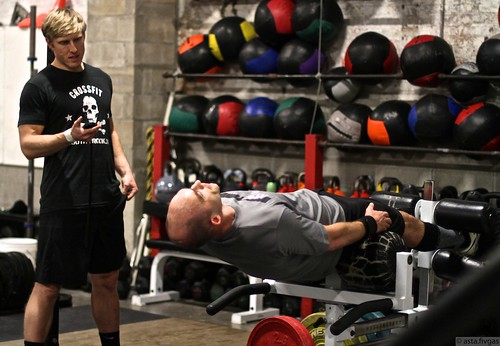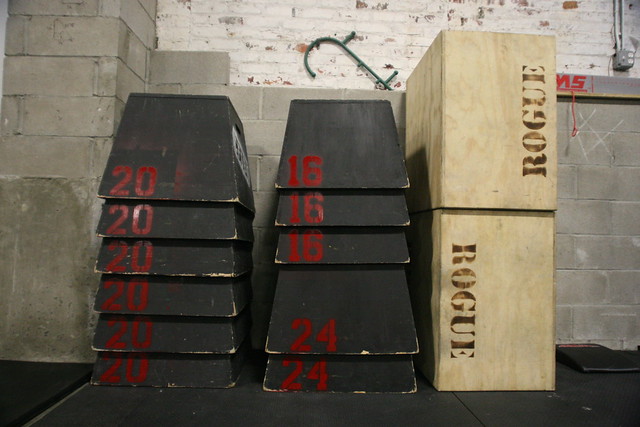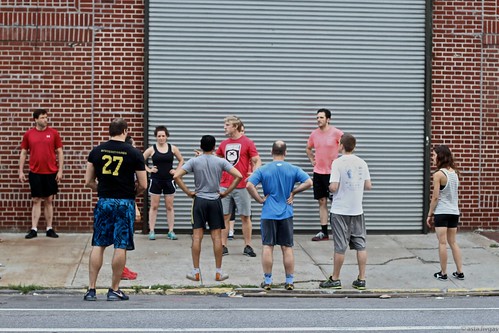
When I decided to start CrossFit South Brooklyn, there wasn’t another CrossFit gym within the 97 square mile span of Brooklyn. Now, if you want to affiliate, it’s more likely than not that there are already other gyms in your area, since we just hit 10,000 affiliates around the world. The ubiquity of CrossFit provides you with a number of examples that can inform what you do or don’t want your gym to look like. It also means that the number of resources to help you along the way is increasing exponentially, this blog being one of them! Plenty of those resources break down the costs of affiliating, and I will certainly address those. But this article will be a response to the questions I’ve historically gotten from people who are interested in starting a gym.
 1. What kind of coaching experience do I need?
1. What kind of coaching experience do I need?
This should go without saying, but if you're looking to be responsible for the health and safety of potentially hundreds of people, you need to know what the fuck you're doing. I was working in the "fitness industry" for several years and had gotten a bachelors degree in exercise science (the latter of which I don't currently recommend) before I felt like I had the experience necessary to open my own gym. While everyone's path will look different, know that it takes years of working with people and learning from your own mistakes before you'll gain legitimate competency in any field. Your “Fran” time is a meaningless qualification here, so don't confuse the two. Jumping into an endeavor like this too soon is like learning how to swim by jumping into the deep end; it's not going to look pretty and the consequences can be catastrophic. You probably won't actually drown, but it might feel like it.
So what do you need to know? You need to understand how all sorts of different bodies move, adapt, and potentially get hurt. You need to experience the typical fitness professional schedule of early (like, really early) mornings and late nights. And you need to work extensively with both individuals and groups, until you get your craft down to a reliable science. Then you can leverage that skillset into a successful and professional business.
Think of it this way: you wouldn't open an auto body shop based on the fact that you enjoy driving your car, so don't think you can open a gym because you love working out. Put in your dues working with people and earn the right to call yourself head coach.
2. What kind of financial concerns should I have? How much money does this take?
In order to answer these questions, you'll need to figure out what your entry point into all of this is going to be. Will you start in your garage or by taking out a loan and going big? What about partners? Are you going to be the only coach initially or do you want to hire additional staff from the outset?
There are lots of associated costs with running a business and the larger you get, the more expensive it becomes. Here’s a list of the potential costs:
- The basic buy-in requirements from CrossFit of affiliation dues ($3,000/year)
- An active Level 1 Certification ($1,000 once, $500 every five years)
- Adequate insurance coverage approved by CrossFit Inc. (this cost varies, around $1,000-$5,000)
- Property costs (more on this below, $1,000-$20,000+)
- Equipment (more on this below, $20,000-50,000K)
People on the Internet like to complain about the price tags associated with certifications and annual affiliation dues but they'll probably be the last thing you'll be thinking about when you start building out bathrooms or putting in an HVAC system. Converting an industrial space into a working gym that people will be lovingly abusing on a daily basis is not cheap. Don’t be surprised if your entire costs hit somewhere around $50,000, if not higher.
Sit down and write out all the resources you already have access to and evaluate your level of risk tolerance. Personally, I'm prone to avoid big risky moves and recommend starting as small as you can and developing a clear plan for growth. In our recent article, “The Affiliate Growth Model,” I talked about how I started in a park with almost no overhead and built it into a thriving affiliate. Starting out like I did might make no sense for you, but you should thoroughly reflect on your ability to gain and retain members before taking such a huge financial risk. Basically, if you’re a shitty coach, you’re not going to be able to hang on to members.
 3. What kind of equipment do I need?
3. What kind of equipment do I need?
Most large, functional fitness vendors like Rogue and Again Faster offer free consultations to discuss what they recommend you start out with equipment-wise, based on your gym size and budget. I recommend calling two to three different vendors to see how they compare before buying anything. Start with plenty of the basics like barbells, pull-up space, boxes, and kettlebells, then move up to fancier equipment as demand requires.
Even with a modest arsenal of equipment, prepare for sticker shock when you get the total. A small affiliate can easily spend $20-50K on the basics. The old Crossfit journal articles also have plenty of advice about how to make your own equipment since it wasn’t always as readily available as it is today. DIY projects like homemade boxes and parallettes or even a rig can be a great way to increase the potential of your equipment budget. Common gym equipment like metal training plates and rowers are also often available on Craigslist or when commercial gyms go under. Being thrifty saves money and makes you a more intelligent equipment consumer. Mismatched equipment is also more punk rock, which is important too.
 4. Do you have any real estate advice? How do I find the perfect space?
4. Do you have any real estate advice? How do I find the perfect space?
Real estate can be a tricky beast. While it's prudent to keep your overhead low initially, you've got to think about where you want to be in a year to two years and not paint yourself into a corner with a space you'll be bursting at the seams in six to 12 months. One of the most common issues I've seen is affiliates signing long-term leases in small spaces. If you think your first location isn't going to be your long-term home base, attempt to get a shorter lease, perhaps one to three years with an extension option built in, just in case things don't go according to your master plan and you've got to stay.
You might also want to work a sublease, or less likely, assignment clause, into your lease as another potential failsafe in case you need to vacate due to your overwhelming success—or failure. A good lawyer who will thoroughly assess the lease and explain how a variety of scenarios could pan out is an excellent investment before signing any dotted lines.
Another real estate concern: CrossFit affiliates are LOUD. It’s not just the loud music; more importantly, the impact of "dropping bumps" can quickly cause you to be the most reviled business on the block or in your area. Don't be brash about this. You need to respect your neighbors and realize that the headache and potential legal issues related to noise disturbances can be costly and severely affect a business’s daily operations. Here in New York City, we've got tons of affiliates who can't drop weights due to noise issues.
If the property is next to other buildings, take a walk to see who your neighbors are and do a "sound test" where you bring in a 135lb bar and have a buddy perform a partial "Grace" while you walk around and see how the noise travels. I would rather have a location slightly off the beaten path than something that feels like prime real estate but will entangle you and your business into ongoing conflict.
If you HAVE to be somewhere that noise is going to be an issue for other people, then you'll need to be as diplomatic as reasonably possible. It's much better to come to some sort of mutual agreement than let your lawyers work out noise issues. We've seen affiliates here in NY spend hundred of thousands of dollars trying to create sound-insulating elevated floors in an attempt to circumvent this issue. Unless you're going to invest in a helicarrier, it's not going to work, trust me.
 Last real estate thought: high ceilings, level floors, and a block or space where you can run outside are going to be biggies for delivering the full-on affiliate experience. As I mentioned earlier, becoming a destination location is a more attractive option that plopping down in the middle of Main Street where you're more likely to be limited in what you can offer. To that end, don't jump on the first place you see, make sure to scope out lots of places, and trust your instincts.
Last real estate thought: high ceilings, level floors, and a block or space where you can run outside are going to be biggies for delivering the full-on affiliate experience. As I mentioned earlier, becoming a destination location is a more attractive option that plopping down in the middle of Main Street where you're more likely to be limited in what you can offer. To that end, don't jump on the first place you see, make sure to scope out lots of places, and trust your instincts.
5. What are some costs I might not anticipate?
If this is your first rodeo starting your own business, there will be lots of unexpected costs. Realize that your budget could easily get tossed out the window if, for instance, you encounter unexpected legal fees pertaining to issues with zoning, or issues with your actual build out. To avoid this, research your local government for programs that can assist with legal costs for new businesses. The NYC SBA set me up with a phenomenal lawyer pro-bono for my first lease agreement, which saved valuable coinage in an already costly transition. I still use the law firm when I need legal advice, though they now happily charge me full price.
6. Okay, what about my life?
While you're out there making the dream come true, you still need to like, feed yourself and have somewhere to lay around in your underwear. Depending on where you're coming from, this venture might require some significant changes to your lifestyle. Your actual existence becomes a strain on the business (since you need to make income), so have a pretty good idea of how much you need to survive—such as rent, transportation, food, any familial costs, existing debt, and a few bucks to go the movies or something so you don't lose your mind.
No two situations are going to be the same, so please don’t hesitate to hit me up with any specific questions you might have. Next week, we’ll be back with information geared more toward people who have owned their gyms for six to 12 months, and might be experiencing a sophomore slump or are looking for ways to keep growing on the right track.